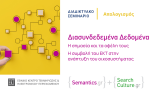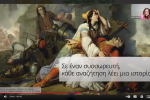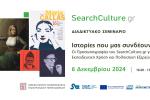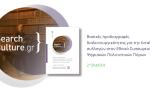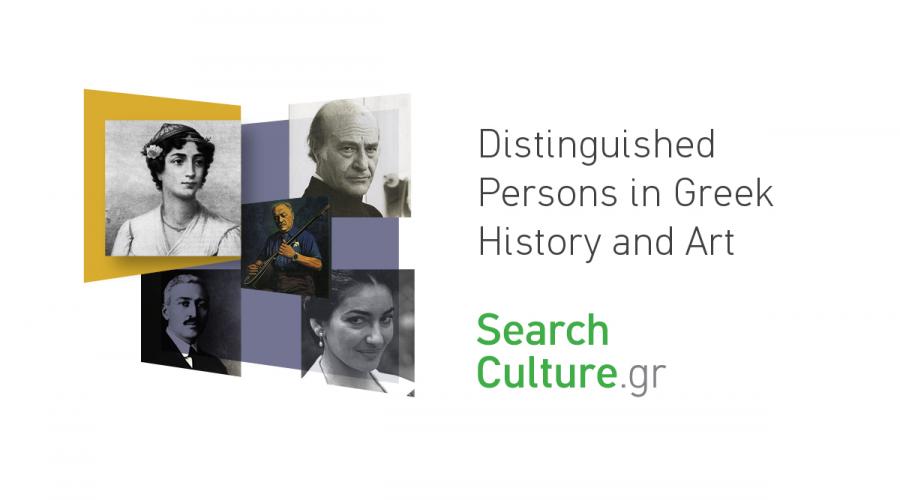
The well attended and highly successful webinar 'Distinguished figures in Greek History and Art from SearchCulture.gr' organised by the National Documentation Centre (EKT) was held on February 10, 2022. The purpose of the webinar was to familiarize participants with the new way of discovering content in the National Aggregator of Digital Cultural Content, SearchCulture.gr, through entities that left their mark on Greek history and culture.
The seminar was attended by 220 participants, including representatives of cultural institutions from which SearchCulture.gr digital collections get aggregated, from museums, libraries and archives, as well as interested librarians, archivists, museologists and archaeologists, university professors and researchers, students and educators, representatives of public bodies, ministries and local self-government, technical contractors of digitization projects and programmers, journalists and translators and interested citizens from Greece and abroad.
Opening the webinar, the Director of EKT, Dr. Evi Sachini, pointed out that SearchCulture.gr has already undergone a decade of development and is now in a phase of maturity, having collected over 780,000 items from 73 organizations. She referred to the SearchCulture.gr infrastructure as being a model cultural data aggregator of Europeana, to which over 500,000 items have already been contributed. She made particular reference to the new search functionality based on Distinguished Figures, noting that this development will open new horizons for research around hitherto unknown aspects of the work of different important people and the relationships between them.
At the same time, however, she stressed that the country lags behind in available digital cultural content, and that it is well behind countries such as the Netherlands, the Czech Republic and Poland. In the phase of maturity of digital technologies that we are going through, we must, she added, produce high quality projects for the digitisation and documentation of our cultural stock, incorporating the basic standards and good practices of openness and interoperability issued by EKT, which provides a common language for digital strategy issues at national level. Dr. Sachini pointed out that the more content collected, the more the aggregator's value is augmented and thus called for a significant increase of the available digital cultural collections in order to promote the country's great cultural heritage in Greece and internationally.
The archaeologist Agathi Papanoti who is responsible for the enrichment of the collections presented the methodology the SearchCulture.gr scientific team used for the semantic enrichment of the content. She first referred to the heterogeneity of the aggregated metadata to demonstrate the need for enrichment and homogenisation. It is common, in collections coming from many different bodies, for entities’ metadata such as authors or contributors, to have typographical or grammatical errors, variations in spelling, nicknames (eg Rigas Feraios, Rigas Velestinlis) or aliases (Nikitas Stamatelopoulos or 'Nikitaras', synonyms and family names (there are, for example, three different people with the name Leon Melas), but also artistic pseudonyms or the name written in different languages.
The entities’ semantic enrichment project was designed to address this complexity so that one can search SearchCulture.gr for records by person and retrieve, in a targeted way, records that either this person has created or that reference this person.
She explained how the two vocabularies created by the project team at Semantics.gr, 'Distinguished Figures in History and Art' and ‘Attributes/ Occupations', were constructed and used. She concluded her presentation with a series of examples using the semantic enrichment tool of Semantics.gr.
Dr. Haris Georgiadis, Project Manager of SearchCulture.gr, presented the new functionality developed for SearchCulture.gr which was based on the previous enrichment processes and which connected the items with the names in the Vocabulary 'Distinguished Figures in Greek History and Art '. He pointed out that in SearchCulture.gr, in addition to the 'Item', which is still the basic entity, a second multidimensional entity was added, that of the Person. Thus, a new separate profile page was created which includes a search engine for easy person tracking, based on a combination of search criteria and result-sharing filters such as name, occupation and date of birth. He presented the various methods of searching and navigating the Distinguished Figures and how the user can easily locate the items that they created or that mention them. In addition, he presented the new search and filtering capabilities that were added to the already existing search engine of SearchCulture.gr.
Users can now search for items or filter the results of a search by selecting one or more individuals and even specifying whether they are looking for items created by these persons or items that refer to them. In addition, they can search for items based on the attribute or occupation of the persons associated with them. Finally, he share the interoperability mechanisms provided by Semantics.gr through which third parties can use the Vocabulary 'Distinguished Figures in Greek History and Art ' for the enrichment and documentation of their digital material were presented
Elena Lagoudi, content curator of SearchCulture.gr, presented use case scenarios for different user communities. On the occasion of the centenary of the Asia Minor Catastrophe, she highlighted different ways of searching for documents related to the year 1922, filtering results and sorting items.
Then, focusing on the sub-category 'Visual Artists' of the Vocabulary of Persons, which includes 1,049 names, she presented an example from the 'Portraits' category. The functionality, she pointed out, is particularly useful for exploring relationships between artists, writers and other people of letters and arts.
She explained how the aggregator's searchbox significantly expands the dynamics of the digital humanities by allowing more complex and interdisciplinary queries and studies. As the available data on the cultural aggregator increases and the archives and digital collections on the internet come together, the work on individual authors is completed and the research process is enhanced.
She brought her presentation to a close with an example from the distinguished persons website, where by searching based on the vocabulary of professions/occupations the user can explore the visual artists in SearchCulture.gr (eg video artists, installation artists, performing artists ).
In the discussion that followed, the audience expressed their enthusiasm for the project and for the event. The project was described as 'Herculean' and heralded by many as an extremely important tool for research and education.
You can watch the video of the event here and the presentations of the speakers here.
Watch the video of the event
About SearchCulture.gr
SearchCulture.gr is the National Aggregator of Digital Cultural Content and the accredited national aggregator for the European digital library Europeana. It collects metadata and preview images of digital cultural resources from the websites and repositories of participating organisations and publishes them enriched in the Search Portal. The upgrade and expansion of the SearchCulture.gr aggregator with new functionalities is being carried out by EKT as part of the operation 'National Information System for Research, Technology,Development, innovation - Aggregation, Documentation and Dissemination of Digital Content & Data, that promotes interoperability, long-term preservation and open access'. The operation is being implemented within the framework of the Operational Programme ' Reform of the Public Sector'(NSRF 2014-2020) and is co-financed by the European Union - European Regional Development Fund and national resources.








